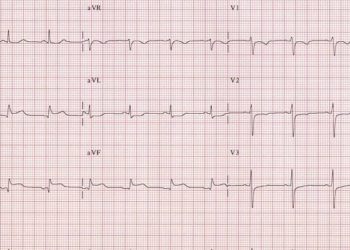Cardiac arrest survival during delivery lowest in those with disseminated intravascular coagulation
1. In this retrospective cohort study, 68% of female patients with cardiac arrest during their delivery survived until hospital discharge.
2. The most common co-occurring diagnosis was acute respiratory distress syndrome.
Evidence Rating Level: 2 (Good)
Study Rundown: Cardiac arrest in pregnant adults is uncommon. However, it is associated with severe morbidity. Based on the Healthcare Cost and Utilization Project (HCUP) National Inpatient Sample (NIS), the overall rate of cardiac arrest from 2017 to 2019 was 13.4 events per 100,000 delivery hospitalizations. Greater than half of the individuals who had a cardiac arrest during their delivery hospitalization survived until hospital discharge. In comparison to patients hospitalized without cardiac arrest, those who had a cardiac arrest during hospitalization were older, more likely to be Black, more likely to have Medicare or Medicaid, and have underlying medical conditions. Those with in-hospital cardiac arrests had longer lengths of stay; however, about half of these individuals had a routine discharge disposition. The most common co-occurring diagnosis for those who had cardiac arrest was acute respiratory distress syndrome. The most common procedure or intervention was mechanical ventilation. Survival to discharge was lower in patients with co-occurring disseminated intravascular coagulation (DIC). Cardiac arrests and amniotic fluid embolisms were highly correlated. A limitation of this study is that the underlying etiology of cardiac arrests could not be ascertained, particularly if it was caused by pregnancy complications or chronic pre-pregnancy disease, or some combination of both.
Click to read the study in AIM
Relevant Reading: β-Blocker use in pregnancy and the risk for congenital malformations
In-Depth [retrospective cohort]: This retrospective cohort study examined cardiac arrest and survival during delivery hospitalization in the United States from 2017 to 2019. Additionally, it examined patient-, hospital-, and community-level characteristics, estimated comorbidities, and percentage of survival to hospital discharge. The study data was extracted from NIS, an all-payer inpatient healthcare database that is publicly available. Pregnant individuals aged 12 to 55 years from 2017 to 2019 were included in the study. A total of 10,921,784 delivery hospitalizations were extracted, where 1,465 cardiac arrests were identified. A total of 1005 (68.6%; 95% CI, 63.2% to 74.0%) adults with cardiac arrest during hospitalization survived to discharge. Compared to those who did not have cardiac arrest during delivery hospitalization, those who experienced cardiac arrest had higher rates of underlying medical conditions such as asthma, diabetes mellitus, hypertension, chronic kidney disease, mental health disorder, substance use disorder, and tobacco use disorder. The median length of stay among delivery hospitalizations with a cardiac arrest was 5.1 days (Interquartile Range (IQR), 5.0 days) compared to 2.0 days (IQR, 0.1 days) for those without. Acute respiratory distress syndrome was the most common comorbid diagnosis (56%; 95% CI, 50.2% to 61.7%). Mechanical ventilation was the most common procedure or intervention (53.2%; CI, 47.5% to 59.0%). Survival to hospital discharge was lower in patients with co-occurring with DIC (54.3%; 95% CI, 39.2% to 69.5%) or without transfusion (50.0% [95%CI, 35.8% to 64.2%]). The rate of cardiac arrests in patients where amniotic fluid embolism was documented was 357.7 cardiac arrests (95% CI, 277.3 to 438.0) per 1,000 deliveries. In summary, this study described the characteristics of cardiac arrest patients during deliveries.
Image: PD
©2023 2 Minute Medicine, Inc. All rights reserved. No works may be reproduced without expressed written consent from 2 Minute Medicine, Inc. Inquire about licensing here. No article should be construed as medical advice and is not intended as such by the authors or by 2 Minute Medicine, Inc.









